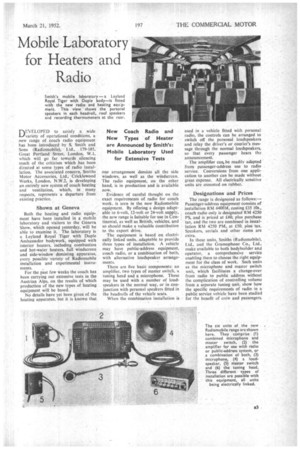Mobile Laboratory for Heaters and Radio
Page 37

If you've noticed an error in this article please click here to report it so we can fix it.
New Coach Radio and New Types of Heater are Announced by Smith's: Mobile Laboratory Used for Extensive Tests
DEvELOPED to satisfy a wide variety of operational conditions, a new range of coach radio equipment has been introduced by S. Smith and Sons (Radiomobile), Ltd., 179-185, Great Portland Street, London, W.1, which will go far towards silencing much of the criticism which has been directed at some types of radio installation. The associated concern, Smiths Motor Accessories, Ltd.; Cricklewood Works, London, N.W.2, is developing an entirely new system of coach heating and ventilation, which, in many respects, represents a departure from existing practice.
Shown at Geneva
Both the heating and radio equipmerit have been installed in a mobile laboratory and visitors to the Geneva Show, which opened yesterday, will be able to examine it. The laboratory is a Leyland Royal Tiger with Duple Ambassador bodywork, equipped with interior heaters, including combustion and hot-water heaters, full windscreen and side-window demisting apparatus, every possible variety of Radiomobile installation and experimental instruments.
For the past few weeks the coach has been carrying out extensive tests in the Austrian Alps, on the results of which production of the new types of heating equipment will be based. No details have yet been given of the heating apparatus, but it is known that one arrangement demists all the side windows, as well as the windscreen. The radio equipment, on the other hand, is in production and is available now.
Evidence of careful thought on the exact requirements of radio for coach work, is seen in the new Radiomobile equipment. By offering a design adaptable to 6-volt, 12-volt or 24-volt supply, the new range is iuitable for use in Continental, as well as British, vehicles, and so should make a valuable contribution to the export drive.
The equipment is based on electrically linked units, adaptable to provide three types of installation. A vehicle may have public-address equipment, coach radio, or a combination of both, with alternative loudspeaker arrangements.
There are five basic components: an amplifier, two types of master switch, a tuning head and a microphone. These may be used with a number of loudspeakers in the normal way, or in conjunction with personal speakers fitted in the headrolls of the vehicle seats.
When the combination installation is used in a vehicle fitted with personal radio, the controls can be arranged to switch off the personal loudspeakers and relay the driver's or codices message through the normal loudspeakers, so that every passenger hears the announcement.
The amplifier can.he readily adapted from passenger-address use to radio service. Conversions from one application to another can be made without great expense. All electrically sensitive units are mounted on rubber.
Designations and Prices The range is designated as follows:— Passenger-address equipment consists of installation RM 4400M, costing £35 10s., coach radio only is designated RM 4250 PS, and is priced at £40; plus purchase tax, and the two are combined in installation RM 4250 PM, at £50, plus tax. Speakers, aerials and other items are extra.
In these units, Smiths (Radiomobile), Ltd.. and the Gramophone Co., Ltd.. make available to both bodybuilder and operator, a comprehensive service enabling them to choose the right equipment for the class of work. Such unite as the microphone and master switch unit, which facilitates a change-over from radio to public address without the complication of controlling volume from a separate tuning unit, show how the specific requirements of radio in a public service vehicle have been studied for the benefit of crew and passengers.




















































































